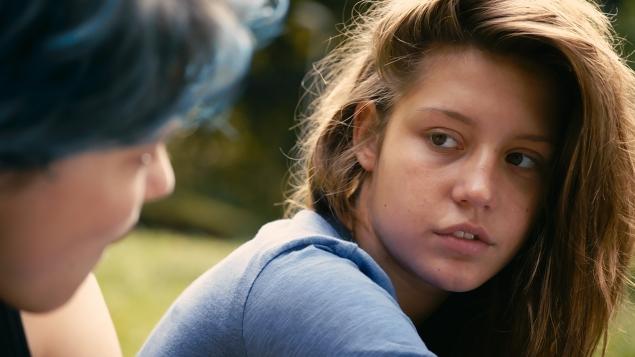A coming of age drama about a young girl discovering her sexuality and in the process, discovering who she is and what she wants in life. Sounds as if it's been done before, and the truth is it has, but these kinds of stories will always have a place in the movies as new generations come of age, and Blue is the Warmest Color (or in France, The Life of Adele, Parts 1 and 2) is just as much a story about modern French society today, and couldn't be more timely or contemporary in feeling.
Adele (played by newcomer Adele Exarchopoulos in a wonderfully natural performance) is a 16 year old girl in high school at the beginning of this movie, vaguely lost in her own thoughts and mixed up feelings about herself. We see her daily routine in intimate close-ups, as director Abdellatif Kechiche seems to have had quite a visual love affair of his own with his leading lady, as the camera fetishizes every part of her, from her mouth to her arms, her legs and everything in between. This extremely intimate and personal style of filmmaking recalls a kind of documentary approach (there is no musical score in this film) and takes us inside Adele's head and into the daily experience of her life as she goes to school, eats dinner with her parents, and has her first sexual experience with a boy who likes her. She thinks she likes him too, but then it turns out something's missing, and that spark of passion Adele is looking for is found in a love-at-first-sight glance with a blue-haired twentysomething woman on the street, played by Lea Seydoux, in the second commanding performance of the movie.
The young woman is Emma, a fine arts major in college, who zeroes in on Adele when she wanders into a gay bar one night looking for her. Their connection is immediate and vital, and elicits exactly the kind of passion Adele is looking to experience. The multi-year relationship she embarks on with Emma is essentially the story of first love and sexual awakening, that explores in intimate detail the world of these two characters and the different facets of life their relationship encounters. We see the inevitable clash between them as drawing partly from class differences (Emma is upper middle class with liberal parents who encourage artistic expression, while Adele is of a working class background with an old-fashioned father who values hard work and a "real" job above everything else), and partly due to Adele's still ambivalent sexuality, which is ultimately left open to interpretation. She finds the passion and awakening she seeks with Emma, and yet throughout the film she remains looking for ultimate fulfillment, never quite satisfied and still with a lot of her life yet to be lived.
The two performances are extraordinary in this film, and extraordinarily brave, as the actresses claimed to have been put through hell by their director, and it shows on screen. The notorious sex scenes, which caused a rowdy controversy at the Cannes Film Festival, are explicit in every sense and it's difficult to imagine how certain acts were faked- yet with much of the film's themes exploring how explosive physical passion can arise due to a particular connection with another person, the graphic nature does not seem entirely out of place, and the actresses make their characters feel real and developed, the sexual attachment between them genuine. It may or may not be true that Kechiche was leery in places (the length of the first sex scene in particular, at 7 minutes, could well be considered excessive), but there is a scene in the film where a character ponders aloud the mystery of female pleasure and bemoans the fact that men will never know the true nature of it, yet will always try to depict it- it's hard not to hear that as a verbal expression of Kechiche's intentions with this movie.
And the film turned out to be an incredibly moving and effective love story, with some of the best acting you'll see all year, for which half the credit must go to the director himself, who used an intense, painstaking approach to elicit emotions as raw and real as possible- and whatever the process, the end result was a powerful and wonderful movie, one of the best and most emotional of the year.
* * * *




